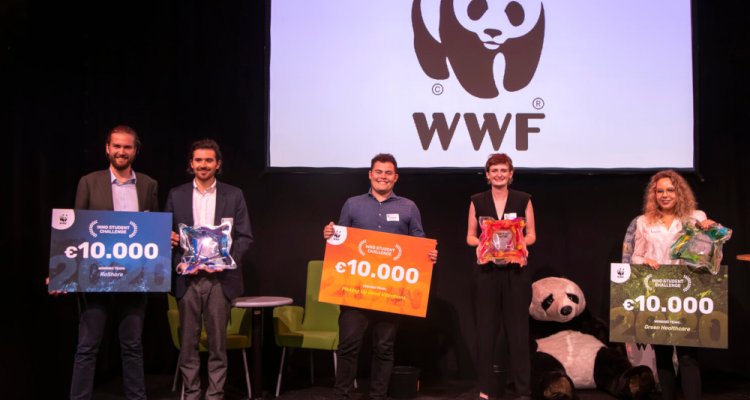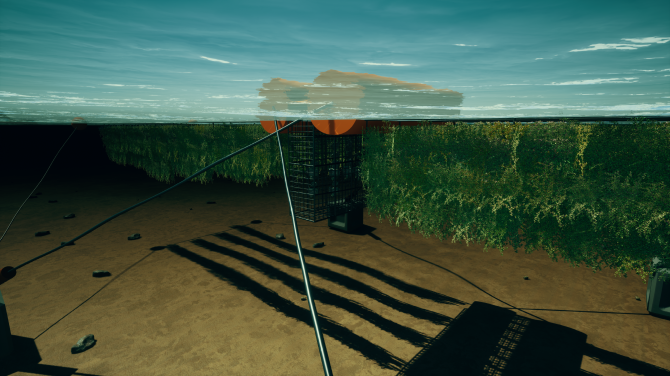
News
‘Living’ breakwater in finals 4TU Impact Challenge
Breakwaters are generally known as the grey colossal concrete structures that protect the coast. Master’s students Mitchell Williams (26) and Frej Gustafsson (23) are convinced there is a more ‘lively’ alternative. Their ReShore design not only protects the land, but it also offers a habitat for marine life such as oysters, mussels and seaweed. They join the national 4TUImpact Challenge finals on 19 November. Wageningen team FarmVent is also still in the race.
ReShore also protects the underlying ecosystem.
‘The first living breakwater is to be tested in the Oosterschelde next year’, say Mitchell Williams (26) and Frej Gustafsson (23) determinedly. The two graduated in the field of Aquaculture and Marine Resource Management and are currently entirely focussed on their invention ReShore. ReShore is a buoyant construction that bears a striking resemblance to a space satellite. The long-legged structures measure some 15 metres each, but when eight such structures are linked together, they form a complete replacement for the robust existing systems designed to protect the coast. Better still, the men state, the living breakwater also protects the underwater ecosystem and creates a suitable living environment for animals and plants such as oysters, mussels and seaweed. ‘Species that form the very foundation of the ecosystem and allow other animals and plants to exist’, Frej, whose primary focus is on the biological aspects, explains. Mitchell, who handles the business side, adds: ‘The crustaceans that grow on the structure are also suited for consumption, depending on the customer’s wishes. We consider, for example, governments, harbours and marine engineering companies.’
Sustainability critical
Whoever buys the living breakwater: sustainability to protect land and sea is critical. Frej and Mitchell think their invention will also benefit vulnerable areas in the ocean, such as mangroves and coral reefs. Frej: ‘We aim to provide tailor-made services. In the North Sea, for example, there is a lack of seagrass, which provides shelter for all sorts of small animals. In such a case, we can design the breakwater so that it allows seagrass to grow beneath it.’

The precise design and choice of materials are still being debated. What is clear, however, is that the breakwater will not be fixed, contrary to conventional concrete breakwaters that are constructed as a wall on the seafloor, or are tethered to an anchor in the sea bed. In its design, ReShore makes use of weighted legs - cement crates as it were – that keep the breakwater in place. They spare the seafloor through crevasses and slots that provide plants and fish with shelter. Mitchell: ‘there will also be cages attached to the breakwater, where mussels and oysters can grow and long lines where plants such as seaweed can attach.’
Alternative for sand suppletion
In their business case, Mitchell and Frej focus on Europe, including the Netherlands, first. Here, there aren’t that many breakwaters in the sea, in contrast to countries such as France and Portugal, where they are found in great numbers along the coast. Mitchell: ‘The Netherlands protects the coast mostly by sand suppletion.’ Frej: ‘Next year we want to show that our breakwater is a good option in the Oosterschelde.’ The two feel that Zeeland is the ideal spot for their pilot: ‘The region is innovative and has a rich oyster and mussel cultivation.’
Moreover, the waves are not all that powerful, so that the trial version isn’t faced with the harshest conditions. After Zeeland, they want to test in the United Kingdom and Sweden, where the young entrepreneurs already have contacts. ‘Our network is increasingly fortified, especially as we won several awards this year, such as the World Wildlife Fund (WWF) INNO Student Challenge. Businesses and experts now reach out to us, rather than us having to take the initiative.’

Should they win the 4TU Impact Challenge on 19 November, their scope will increase even further. The winner of this challenge is to join the Dutch trade delegation at the Dubai World Expo. ‘Dubai is particularly interesting. As a leading harbour, their marine industry is highly developed, and they have considerable expertise in marine construction’, Mitchell states. The Expo has been postponed due to the corona pandemic, but this will not deter the entrepreneurs. ‘We start in the Oosterschelde, and aim to roll-out our breakwater globally within two to five years.’
The first living breakwater is to be tested in the Oosterschelde next year.
Dutch 4TU Impact Challenge
With the Dutch 4TU Impact Challenge, the four technical universities in the Netherlands – Delft, Twente, Eindhoven and Wageningen – aim to stimulate students to combine innovative ideas with entrepreneurship. After four regional preliminaries, the finals are held on Thursday 19 November. There, the last 8 remaining teams (two per university) will pitch their idea for a jury of five experts. The winner will join the Dutch trade mission at the Dubai World Expo (currently postponed due to the corona pandemic). There is also an audience prize of 1500 euros. Wageningen University & Research is represented by the ReShore and FarmVent teams. The latter developed a vending machine for herbs that can be harvested in the supermarket. The event can be followed online on the website.